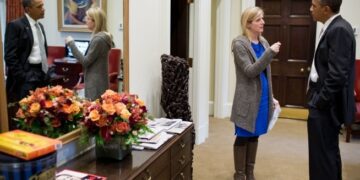By John F. Di Leo -
The Chinese government announced on May 19 that they are immediately putting much of the city of Tianjin under the martial-law style Covid lockdowns for which Chairman Xi Jinping will be remembered.
As he has previously done in Wuhan, Shenzhen, and other major cities, residents are restricted to their homes and require special permission to leave. While businesses may not be formally closed, they cannot reopen without staff, so they are unable to function unless they are fortunate enough to be completely outside the shuttered zone, and rely on staffs also outside the shuttered zones.
Tianjin is the primary seaport for the capital city of Beijing, one of the largest ports in northern China, and one of the busiest ports in the world.
How long will it be closed? How long will Chinese authorities with hazmat suits and megaphones be walking or driving down the street, warning people to stay in their homes? It’s difficult to predict.
Chairman Xi’s zero-Covid policy is just that, a commitment to lock down a city until there are no new positive Covid tests there.
The city and port of Shanghai, another of the busiest ports in the world (or possibly THE busiest, depending on how you measure it) has been largely shut down since late March, with no end in sight. It is therefore reasonable to assume that the Tianjin closure will last as long.
What does this mean to the rest of the world?
Certainly, more disruption in ocean shipping, as yet another globally critical seaport is taken out of the mix for all intents and purposes.
Certainly, more disruption for American importers, who depend on either finished goods, raw materials, or components for manufacture, from vendors in and around Tianjin.
And certainly, more fear for all involved in the global economy, as we see the draconian assault on commerce by Chairman Xi’s regime continue unabated.
But it is more impactful even than that, because just as the world is intra-dependent for raw materials, components and finished goods from country to country, so too are the manufacturers of China entirely dependent upon other manufacturers across China.
Every time the Politburo shuts down another Chinese city, American and European manufacturers rush to check with their purchasing and logistics departments, to find out whether they have vendors in that city. “Do we buy from Shanghai?” “Do we buy from Shenzhen?” “Do we buy from Wuhan?”
Every time they are told “No,” they breathe a collective sigh of relief, only to find in the weeks to come that they have other vendors, in towns that are not locked down, all over the world, that are impacted because they depend on the locked-down cities for materials themselves.
If you buy from Qingdao or Wenzhou, or even from Japan or South Korea or Mexico or Brazil or Australia or Germany or another vendor here in the USA… And THOSE vendors depend on parts from Shanghai and Tianjin, then those supply chains too will obviously suffer.
There is a lesson that the world simply must learn: If China was ever a dependable economic partner, it sure isn’t anymore.
We can wonder why Beijing is taking these approaches.
We can wonder why Beijing thinks that lockdowns are still even on the table, after 2 1/2 years of this pandemic, as lockdowns have been statistically proven to be absolutely and utterly useless in affecting the spread of the virus.
Somehow, for some reason, Chairman Xi must have come to the conclusion, with the support of his politburo, that the damage they are inflicting upon the rest of the global economy is worth the damage that they are inflicting upon their own country.
Why?
Well, first we must remember, after a century of watching the behavior of the Chinese communist party, that their values are not our values. That might provide some hint…
But such curiosity is an academic endeavor - interesting, but not helpful.
First and foremost, we must acknowledge reality. And the current reality is that China is not a dependable source for raw materials, components, or finished goods.
The sooner our economy – and every individual participant in it, from manufacturer to distributor to retailer – understands and accepts that fact, and adjusts accordingly, the sooner we will inoculate ourselves from the global economic crisis that China is in the process of unleashing.
Copyright 2022 John F Di Leo
A collection of John’s Illinois Review articles about vote fraud, The Tales of Little Pavel, and his 2021 political satires about current events, Evening Soup with Basement Joe, Volumes One and Two, are available, in either paperback or eBook, only on Amazon.
Don’t miss an article! Use the free tool in the margin to sign up for Illinois Review’s free email notification service, so that you always know when we publish new content!
(photo credit: APM Terminals, Tianjin, PRC)








